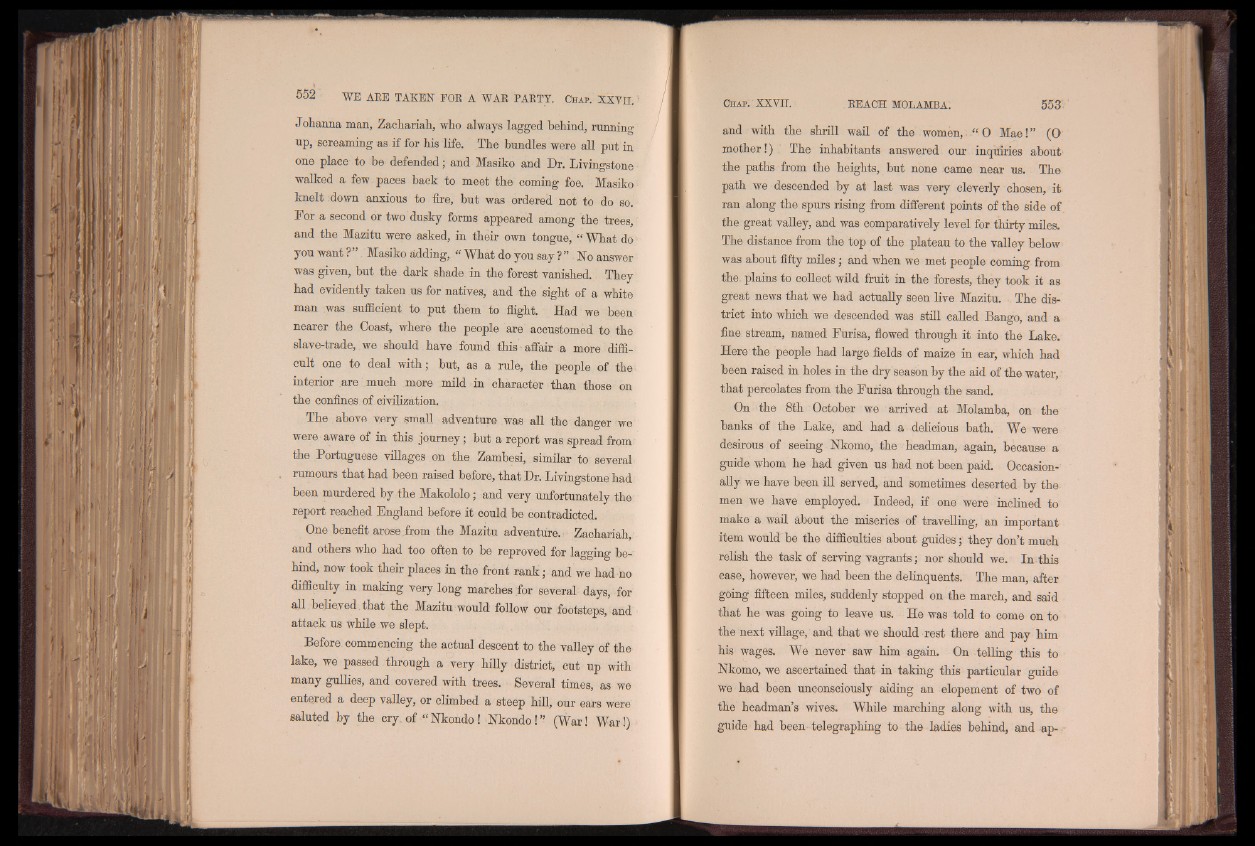
Johanna man, Zachariah, who always lagged behind, running
up, screaming as if for his life. The bundles were all put in
one place to be defended; and Masibo and Dr. Livingstone
walked a few paces back to meet the coming foe. Masiko
knelt down anxious to fire, but was ordered not to do so.
For a second or two dusky forms appeared among the trees,
and the Mazitu were asked, in their own tongue, “ What do
you want ?” Masiko adding, “ What do you say ?” No answer
was given, but the dark shade in the forest vanished. They
had evidently taken us for natives, and the sight of a white
man was sufficient to put them to flight. Had we been
nearer the Coast, where the people are accustomed to the
slave-trade, we should have found this affair a more difficult
one to deal with; but, as a rule, the people of the
interior are much more mild in character than those on
the confines of civilization.
The above very small adventure was all the danger we
were aware of in this journey; but a report was spread from
the Portuguese villages on the. Zambesi, similar to several
rumours that had been raised before, that Dr. Livingstone had
been murdered by the Makololo; and very unfortunately the
report reached England before it could be contradicted.
One benefit arose .from the Mazitu adventure.: Zachariah,
and others who had too often to be reproved for lagging behind,
now took their places in the front rank; and we had no
difficulty in making very long marches for several days, for
all believed that the Mazitu would follow our footsteps, and
attack us while we slept.
Before commencing the actual descent to the valley of the
lake, we passed through a very hilly district, cut up with
many gullies, and covered with trees. Several times, as we
entered a deep valley, or climbed a steep hill, our ears were
saluted by the cry. of “Nkondo! Nkondo!” (War! War!)
and with the shrill wail of the women,. “ 0 Mae!” (0
mother!) The inhabitants answered our inquiries about
the paths from the heights, but none came near us. The
path we descended by at last was very cleverly chosen, it
ran along the spurs rising from different points of the side of
the great valley, and was comparatively level for thirty miles.
The distance from the top of the plateau to the valley below
was about fifty miles; and when we met people coming from
the. plains to collect wild fruit in the forests, they took it as
great news that we had actually seen live Mazitu. The district
into which we descended was still called Bango, and a
fine stream, named Furisa, flowed through it into the Lake.
Here the people had large fields of maize in ear, which had
been raised in holes in the dry season by the aid of the water,
that percolates from the Furisa through the sand.
On the 8th October we arrived at Molamba, on the
banks of the Lake, and had a delicious bath. We were
desirous of seeing Nkomo, the headman, again, because a
guide whom he had given us had not been paid. Occasionally
we have been ill served, and sometimes deserted by the
men we have employed. Indeed, if one were in c lin ed to
make a wail about the miseries of travelling, an important
item would be the difficulties about guides; they don’t much
relish the task of serving vagrants; nor should we. In this
ease, however, we had been the delinquents. The man after
going fifteen miles, suddenly stopped on the march, and said
that he was going to leave us. He was told to come on to
the next village, and that we should rest there and pay h im
his wages. We never saw him again. On telling this to
Nkomo, we ascertained that in taking this particular guide
we had been unconsciously aiding an elopement of two of
the headman’s wives. While marching along with us, the
guide had been telegraphing to the ladies behind, and ap